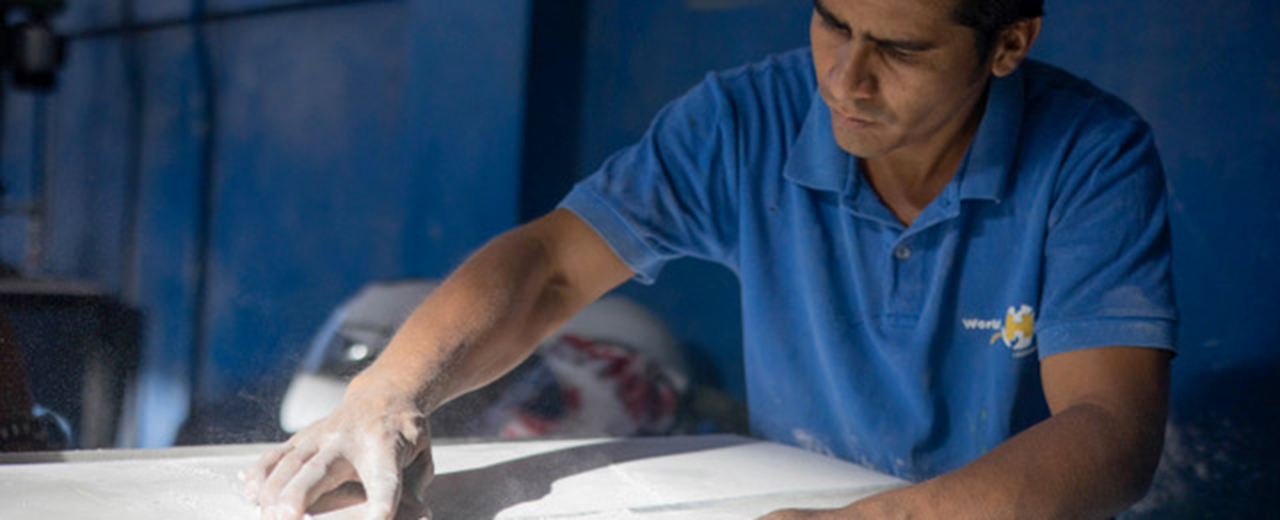 Fighting poverty with entrepreneurial spirit
Fighting poverty with entrepreneurial spirit
Vocational training and mentoring for robust self-employment
"Your shipment is on its way," Juan types into his smartphone in Spanish. His online shop for imported goods in Managua, the capital of Nicaragua, is booming. He has achieved what many dream of: the rise from a child of penniless parents in the countryside to a respected entrepreneur. Success stories like Juan's are rare in rural areas of Nicaragua: While many people start their own businesses here, where jobs are scarce, most of them are unprofitable. In addition to vocational training, many simply lack basic accounting skills. "I know many who failed and got into debt," Juan says. That's why he now passes on his knowledge: in workshops on topics such as business plans, digitalisation and much more, he shares his know-how about self-employment with trainees. "My path was rocky. I often wished I had had a good advisor by my side. I can be that now!”
Necessity
Access to vocational training in a promising sector and accounting skills for financially disadvantaged Nicaraguans
Activity
People with a viable business idea receive a vocational training scholarship, workshops on self-employment and are assigned a personal mentor
Countable effort
Number of hours of vocational training and mentoring
Result
The scholarship holders have successfully completed their vocational training and are building up a strong business
Systemic effect
Successful entrepreneurs create better income opportunities in their villages through new jobs
Background
With your good deed, you enable structurally disadvantaged people in Nicaragua to receive vocational training at a government-approved training institute. The good deed finances the tuition costs as well as living expenses and, if necessary, childcare. Because only those who are free of financial worries can concentrate fully on what they need to learn. What distinguishes all scholarship holders is that they want to realise a sustainable business idea. That is why they also learn the basics of self-employment in monthly training sessions. Together with a mentor, they develop an individual business plan and realise their own projects in their villages. The good deed thus not only gives people long-term financial security, but also a chance for personal development. This also benefits others: The scholarship holders bring their newly acquired knowledge to their village communities and create new income opportunities in the countryside in the long term.
The good deed
Nicaragua has been making negative headlines for years: Corruption is on the rise, freedom of the press is declining - the West is responding with sanctions, foreign companies are moving away and tourism is in decline. As a result, between 2017 and 2020, Nicaragua's economic output fell by almost 9% (World Bank, 2021) and in 2018 alone, more than 400,000 people are estimated to have lost their jobs following political unrest (ACAPS, 2019). Competition for jobs in the country is increasing and wages are falling. This is pushing many people to the edge of their livelihoods, especially in rural areas: In 2021, 45% of Nicaraguans in work did not earn enough money to support themselves (INIDE, 2021) - let alone finance a qualified education for themselves or family members that could bring better job opportunities. Education in Nicaragua is not subsidised; on the contrary, there are costs for tuition, travel and books. After leaving school, many Nicaraguans work as unskilled labourers for little money, sometimes under difficult conditions, in the informal sector instead of learning a trade. This cycle of lack of jobs, low wages and thus obstructed educational opportunities, which denies Nicaraguan families the chance of financial security, is countered here: On the one hand, by funding qualified vocational training in the agricultural, service and trade sectors. On the other hand, by enabling the trainees to become more independent of the prevailing labour market through an intensive mentoring programme for starting a business. After all, sustainable self-employment makes long-term financial security possible.

About Nicaragua
Managua
Capital
6,702,379
Number of inhabitants
2,090.8
Gross domestic product per capita per year
Rang 126 von 191
Human Development Index
Strong and courageous women: Nicaragua was the first country in Latin America with a female president. Violeta Chamorro held office between 1990 and 1997.
About the organization and further information
Association
Puente Nica e.V. - Bildungs- und Kulturverein für den deutsch-nicaraguanischen Austausch
Website

Further information and source
- Transparency International, Januar 2021. Corruption Perception Index 2020, Berlin. (abgerufen 07.04.2022)
- Christina Fee Moebus, 21.07.2019. ARD (Tagesschau), Mehr als 300 Tote durch Unruhen. (abgerufen 07.04.2022)
- World Bank Group, 06.10.2021. The World Bank In Nicaragua. (abgerufen 07.04.2022)
- ACAPS, 2021. Nicaragua Socioeconomic crisis. (abgerufen 07.04.2022)
- Instituto Nacional de Información de Desarrollo INIDE, 2021. Informe de empleo. Encuesta continua de hogares (ECH), III trimestre 2021, Managua.(abgerufen 07.04.2022)




